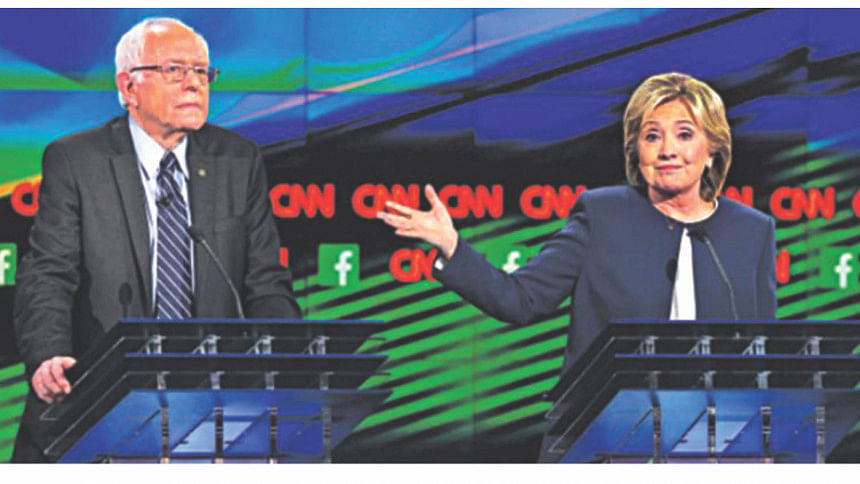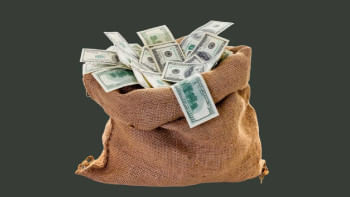LIVING LIFE LIKE A RHINOCEROS

The race for the United States presidency is heating up with the launching of the much discussed presidential debates. The debates are in a way, the "Greatest Political Show on Earth" with the media publicising the US presidential elections as the contest for the "Leader of the Free World".
The Republican Party debates kicked off in August this year with the usual media hype and pageantry surrounding the political wrestling match. As most readers are aware, to date, Donald Trump seems to be ahead of the race owing to his outlandish pronouncements and characteristic obduracy. Despite severe media and public criticism for his gaffes on women and immigrants, he has stood his stance and continues to lead the pack of Republican contestants.
Last night (October 13), it was the turn of the Democratic candidates to unfurl their programmes and to express their positions on key national and global issues. Together with 15 million Americans, I too, stayed glued to the TV, watching the democratic heavyweights debate a wide slew of issues. The show provided some rare insights into the thinking of the candidates. However, my mind drifted toward a somewhat different track. As I watched the candidates spar with each other, as they deflected the sensitive questions, ducked the criticisms and superbly steered the debate to their advantage, I was convinced that politicians have the same thick hide whether in the United States, Bangladesh or elsewhere.
To be a successful politician, one must be thick-skinned, slippery and ingenious. It was amazing how Hillary Clinton deflected questions about her email controversy and mishandling of the Libya Embassy attack, how Bernie Sander's stood his ground against gun control, being fully aware of the havoc gun violence has created in the country, how Lincoln Chaffee managed to convert his turncoat party record into one of adhering to principles. I marvelled at the resilience and steely nerves of the candidates and their unemotional handling of the accusations and counter accusations. This is perhaps the stuff politicians are made of, or perhaps, the material that vouches for success in life itself!
People argue that the good thing about hard-headed people is that they don't allow setbacks to deter them . . . this is euphemistically termed as "resilience". They may be right - Donald Trump seems to be surging in the popularity polls and political pundits declared Hilary Clinton as the winner of last night's debate, since both display pizzazz – who cares about substance? At one point, Hilary confidently claimed: "I am still standing", in the face of severe criticism. The audience took that as a sign of confidence, grit and determination.
It deeply saddens me that our "success-oriented" society has come to accept, and in fact admire, the qualities which make us ruthlessly competitive, uncaring, and impervious to criticism, bulldozing our way to the top. Where does this put authentic people who are sensitive, emotional and are inclined to stick to their values and principles? I sometimes wonder: Is the end game all that we live for?
Friends have often criticised me for being "too sensitive" and letting my emotions come in the way of my goals. True, we sensitive individuals may not always reach the peak, but we are blessed that we feel, we emote, we get hurt but we also let our love flow freely. The most painful failures in people's lives are the failures that involve relationships. And what does success matter if we have been insensitive to the pain we have caused to those we love or if people have moved away from us because we never "listened" to them.
I sincerely believe that there is something magically inspiring about living life intensely and sensitively. Let's not be afraid of wearing our heart on our sleeves, sometimes even exposing our vulnerability. It may mean we get hurt more. But it also helps us remain connected to our world and we become more open to receiving and giving love.
I suspect some readers are wondering how my advocacy for more authenticity in human interactions relates to the Democratic Presidential debate. The connecting tissue is the almost universal acceptance of a politician's hypocritical tactic as an ingredient for achieving success. Many in the media are waxing eloquent about the participating candidates maintaining a detached equilibrium in the face of severe criticisms on critical issues. Their supporters are saying this is a true mark of strength and character. But I, for one, would have wanted them to react with more passion and intensity. I wanted to see their emotions - anger, outrage, dismay and grief - expressed in words and gestures at the controversies surrounding race, income inequity, gun violence. It would have convinced me that apart from being successful politicians they empathise with us ordinary people. And that they too are human like you and me!
The writer is a renowned Rabindra Sangeet exponent and a former employee of the World Bank.
E-mail: [email protected]

 For all latest news, follow The Daily Star's Google News channel.
For all latest news, follow The Daily Star's Google News channel. 



Comments